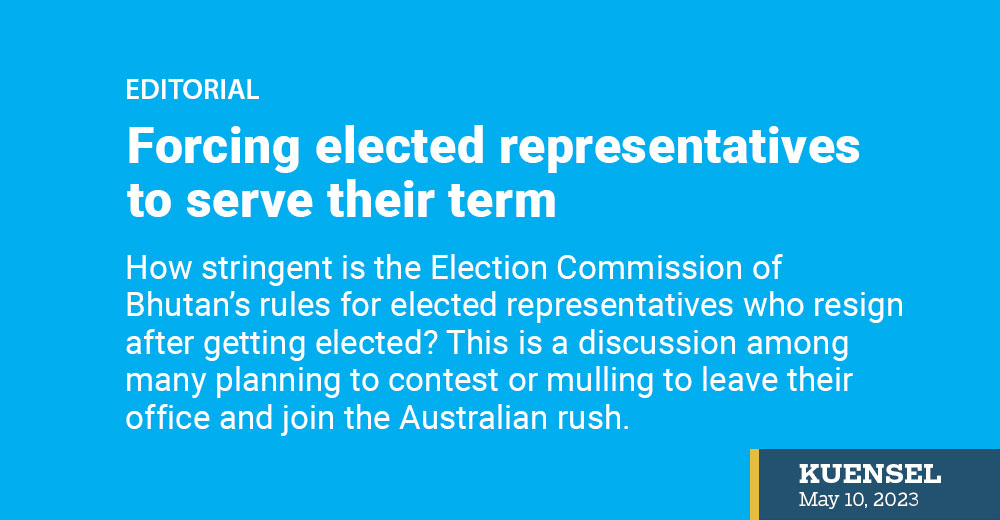How stringent is the Election Commission of Bhutan’s rules for elected representatives who resign after getting elected? This is a discussion among many planning to contest or mulling to leave their office and join the Australian rush.
Many elected leaders resigned, in the past, for various reasons midway through their term. There were no rules and it was a loss to the government as by-elections had to be conducted. By-elections cost the government. It is an expensive affair.
The Rules on Election Conduct in the Kingdom of Bhutan 2022, empowers the ECB to fine elected candidates who resign without reasonable necessity, as determined by the Commission, a minimum wage for 360 days, refund all state campaign funds and disqualify the candidate from contesting in future elections. Such a rule is necessary especially when candidates campaign on the promise of “serving the people” or being the “bridge between the people and the Zhung (government).”
The big question is, will it stop elected representatives from resigning? In today’s context, the Australian rush has become too good to resist any opportunity in the country. A common comparison is a cleaner in Australia earning more than the Prime minister of Bhutan!
The rule came into force in August 2022. Since the implementation of the new rules and regulations, a gup, a mangmi and three tshogpas resigned.
The monetary fines or penalties will not stop elected representatives from resigning if they get the “Visa grant notice.” In the recent past, a Gup tendered his resignation soon after he was elected to go to Australia as a dependent to his wife. The Gup even offered to fund the by-elections in the gewog to ensure there would be no bumps on his road to Australia.
Local government elections are comparatively cheaper compared with parliamentary elections. There is no state campaign funding and a by-election is restricted to a gewog. However, it is not a healthy trend when elected representatives resign after assuming office. The cost of a by-election is insignificant when compared with the voters losing faith in elections. In the villages, the average voters believe that the leader they elect will benefit them. When they leave midway through their term, it will shake the confidence of people in elections or democracy.
The “stringent” rules may act as a deterrence for a few. It is not going to stop the Australia-bound gup, Mangmi or Tshogpa. It may discourage a member of parliament who would prefer to be a “Dasho” with the blue kabney and Patang dangling, for at least five years. But the opportunity presented is too good to be resisted.
A condition, weird it may sound, could be ECB asking aspiring candidates if they would complete their term. This is already happening in many organisations, institutions including the private sector where employers are mindful of the Australia rush when recruiting.
For the elected representatives, whether at local governance or at national level, it is their moral duty to fulfill what they promised the voters when they went begging for votes.


